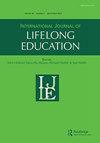Emergence studios: bringing collaboration and iteration into the social sciences
IF 1.9
Q2 EDUCATION & EDUCATIONAL RESEARCH
引用次数: 0
Abstract
ABSTRACT This paper synthesises theory and practice literature to define a new type of learning space: emergence studios. Emergence studios incorporate iterative, collaborative, and creative elements into graduate education in the social sciences. While some disciplines have a long history of studio spaces and others have begun to implement applied spaces like makerspaces and digital humanities labs, the social sciences rarely offer spaces for application and imagination. Some programmes are exploring how to foster a learning environment where students work together to imagine structures for addressing systemic issues, what I term ‘emergence studios’. The principles of emergence studios are explored through theoretical concepts (empathetic, experiential, and ecological) and current practices (makerspaces, digital humanities laboratories, and design studios). Then, this paper uses worldbuilding techniques to outline a new type of experiential classroom space that acknowledges the complexity of our interconnected world and the need for learning that cannot be predetermined by learning objectives. By exploring related literature, this article defines an evolving practice and provides a starting point for further exploration.新兴工作室:将协作和迭代带入社会科学
摘要本文综合了理论和实践文献,定义了一种新型的学习空间:涌现工作室。Emergence工作室将迭代、协作和创造性元素融入社会科学研究生教育中。虽然一些学科有着悠久的工作室空间历史,而另一些学科已经开始实施应用空间,如makerspaces和数字人文实验室,但社会科学很少提供应用和想象的空间。一些项目正在探索如何营造一个学习环境,让学生们一起想象解决系统性问题的结构,我称之为“涌现工作室”。涌现工作室的原则是通过理论概念(移情、体验和生态)和当前实践(制造空间、数字人文实验室和设计工作室)来探索的。然后,本文使用世界构建技术勾勒出一种新型的体验式课堂空间,这种空间承认了我们相互联系的世界的复杂性,以及学习目标无法预先确定的学习需求。通过探索相关文献,本文定义了一种不断发展的实践,并为进一步探索提供了起点。
本文章由计算机程序翻译,如有差异,请以英文原文为准。
求助全文
约1分钟内获得全文
求助全文
来源期刊

International Journal of Lifelong Education
EDUCATION & EDUCATIONAL RESEARCH-
CiteScore
3.10
自引率
27.80%
发文量
40
期刊介绍:
The International Journal of Lifelong Education provides a forum for debate on the principles and practice of lifelong, adult, continuing, recurrent and initial education and learning, whether in formal, institutional or informal settings. Common themes include social purpose in lifelong education, and sociological, policy and political studies of lifelong education. The journal recognises that research into lifelong learning needs to focus on the relationships between schooling, later learning, active citizenship and personal fulfilment, as well as the relationship between schooling, employability and economic development.
 求助内容:
求助内容: 应助结果提醒方式:
应助结果提醒方式:


